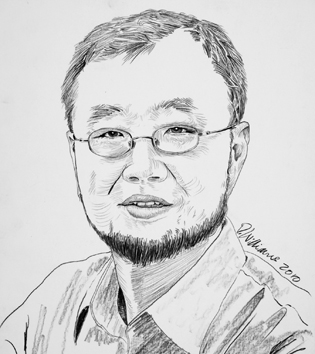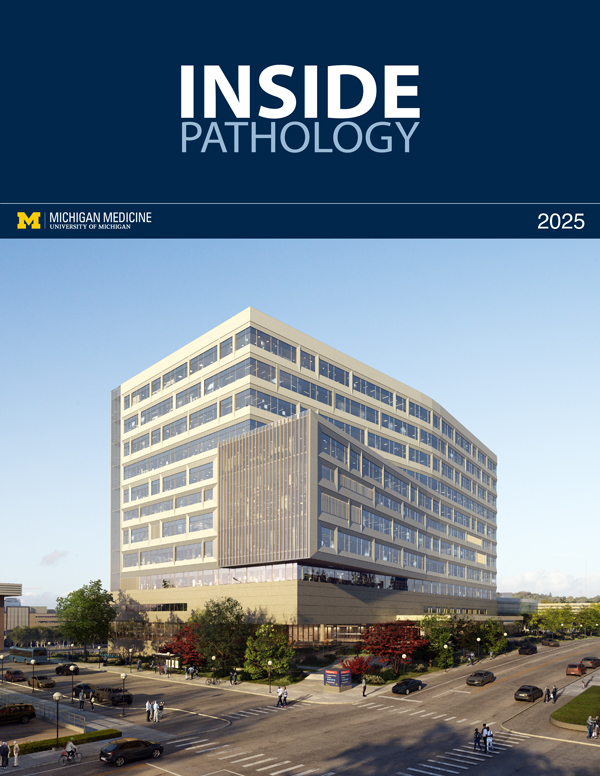


Professor of Pathology
Inflammation & Immunology
Experimental Pathology
Kenneth and Judy Betz Family Endowed Professor
Mary H. Weiser Food Allergy Center
University of Michigan Medical School, Ann Arbor
chhkim@med.umich.edu
 Education and Training
Education and Training
B.S., Korea Advanced Institute of Science and Technology (KAIST), Biological Science
M.S., Korea Advanced Institute of Science and Technology (KAIST), Biological Science & Engineering
Research Scientist, LG Chemical
PhD, Indiana University School of Medicine, Immunology, and Hematopoiesis
Postdoctoral Fellow, Stanford University School of Medicine, Immunology and Lymphocyte Trafficking
Key Research Accomplishments
1) Discovered T cells (GC Tfh and Tfr cells) that regulate B cell responses. We found the presence of CD4+ Th cells in germinal centers, and these cells are specialized in helping B cell differentiation and antibody production. Moreover, we discovered the presence of FoxP3+ T cells in germinal centers and these cells suppress the functions of B cells and Tfh cells. This was the first documentation of Tfr cells in the literature.
2) Established trafficking mechanisms of functionally specialized lymphocytes. We have been studying lymphocyte trafficking for more than two decades. We defined the trafficking receptor profiles and migration behaviors of key effector T cells such as Th1, Th2, Th17, FoxP3+ T cells, and NKT cells along with their effector functions in regulating immune responses and inflammation. Most recently, we reported that innate lymphoid cell subsets such as ILC1 and ILC3 undergo trafficking receptor switches in secondary lymphoid tissues a manner similar to Th cells to migrate into the intestine. In contrast, ILC2 acquire the migration potential in the bone marrow.
3) Identified the roles of retinoic acid and nuclear hormones in regulating immune responses. We discovered the role of retinoic acid in inducing FoxP3+ T cells. We went on to demonstrate the in vivo role of vitamin A in regulating inflammatory bowel disease. We also found that retinoic acid is required for migration and effector function of Th17 cells in the gut. In addition, we found that progesterone, a female sex hormone, generates FoxP3+ and FoxP3- regulatory T cells, which is perhaps important for suppression of allogeneic immune responses during pregnancy.
4) Discovered the roles of the gut microbial metabolites in regulating immune responses. The commensal bacteria in the gut produce metabolites that are important for hosts in many different aspects. We found the roles of the gut microbial metabolites short-chain fatty acids (SCFAs) in potentiating epithelial innate immune responses to invading microbes. We also found that SCFAs boost the production of both effector (Th1 and Th17) and IL-10+ regulatory T cells. Recently, we reported that SCFAs support mucosal and systemic B cell responses.
5) Found chemokines that regulate the homing of hematopoietic stem and progenitor cells. Major factors that regulate the trafficking of hematopoietic stem and progenitor cells were unknown in 1990’s. We found that SDF-1 (now commonly called CXCL12) regulates the migration of stem and progenitor cells and demonstrated that it is the most important trafficking factor for hematopoietic stem and progenitor cells in the bone marrow. Similarly, we demonstrated that it is the most efficacious chemoattractant for primitive T cell progenitors in the thymus. This finding set the stage for the widespread research on SDF-1 (also called CXCL12) in regulating cell migration and hematopoiesis. Utilizing transgenic mice, we further found that SDF-1 is an important growth factor for stem and progenitor cells.
 ON THE COVER
ON THE COVER
Breast team reviewing a patient's slide. (From left to right) Ghassan Allo, Fellow; Laura Walters, Clinical Lecturer; Celina Kleer, Professor. See Article 2014Department Chair |

newsletter
INSIDE PATHOLOGYAbout Our NewsletterInside Pathology is an newsletter published by the Chairman's Office to bring news and updates from inside the department's research and to become familiar with those leading it. It is our hope that those who read it will enjoy hearing about those new and familiar, and perhaps help in furthering our research. CONTENTS
|
 ON THE COVER
ON THE COVER
Autopsy Technician draws blood while working in the Wayne County morgue. See Article 2016Department Chair |

newsletter
INSIDE PATHOLOGYAbout Our NewsletterInside Pathology is an newsletter published by the Chairman's Office to bring news and updates from inside the department's research and to become familiar with those leading it. It is our hope that those who read it will enjoy hearing about those new and familiar, and perhaps help in furthering our research. CONTENTS
|
 ON THE COVER
ON THE COVER
Dr. Sriram Venneti, MD, PhD and Postdoctoral Fellow, Chan Chung, PhD investigate pediatric brain cancer. See Article 2017Department Chair |

newsletter
INSIDE PATHOLOGYAbout Our NewsletterInside Pathology is an newsletter published by the Chairman's Office to bring news and updates from inside the department's research and to become familiar with those leading it. It is our hope that those who read it will enjoy hearing about those new and familiar, and perhaps help in furthering our research. CONTENTS
|
 ON THE COVER
ON THE COVER
Director of the Neuropathology Fellowship, Dr. Sandra Camelo-Piragua serves on the Patient and Family Advisory Council. 2018Department Chair |

newsletter
INSIDE PATHOLOGYAbout Our NewsletterInside Pathology is an newsletter published by the Chairman's Office to bring news and updates from inside the department's research and to become familiar with those leading it. It is our hope that those who read it will enjoy hearing about those new and familiar, and perhaps help in furthering our research. CONTENTS
|
 ON THE COVER
ON THE COVER
Residents Ashley Bradt (left) and William Perry work at a multi-headed scope in our new facility. 2019Department Chair |

newsletter
INSIDE PATHOLOGYAbout Our NewsletterInside Pathology is an newsletter published by the Chairman's Office to bring news and updates from inside the department's research and to become familiar with those leading it. It is our hope that those who read it will enjoy hearing about those new and familiar, and perhaps help in furthering our research. CONTENTS
|
 ON THE COVER
ON THE COVER
Dr. Kristine Konopka (right) instructing residents while using a multi-headed microscope. 2020Department Chair |

newsletter
INSIDE PATHOLOGYAbout Our NewsletterInside Pathology is an newsletter published by the Chairman's Office to bring news and updates from inside the department's research and to become familiar with those leading it. It is our hope that those who read it will enjoy hearing about those new and familiar, and perhaps help in furthering our research. CONTENTS
|
 ON THE COVER
ON THE COVER
Patient specimens poised for COVID-19 PCR testing. 2021Department Chair |

newsletter
INSIDE PATHOLOGYAbout Our NewsletterInside Pathology is an newsletter published by the Chairman's Office to bring news and updates from inside the department's research and to become familiar with those leading it. It is our hope that those who read it will enjoy hearing about those new and familiar, and perhaps help in furthering our research. CONTENTS
|
 ON THE COVER
ON THE COVER
Dr. Pantanowitz demonstrates using machine learning in analyzing slides. 2022Department Chair |

newsletter
INSIDE PATHOLOGYAbout Our NewsletterInside Pathology is an newsletter published by the Chairman's Office to bring news and updates from inside the department's research and to become familiar with those leading it. It is our hope that those who read it will enjoy hearing about those new and familiar, and perhaps help in furthering our research. CONTENTS
|
 ON THE COVER
ON THE COVER
(Left to Right) Drs. Angela Wu, Laura Lamps, and Maria Westerhoff. 2023Department Chair |

newsletter
INSIDE PATHOLOGYAbout Our NewsletterInside Pathology is an newsletter published by the Chairman's Office to bring news and updates from inside the department's research and to become familiar with those leading it. It is our hope that those who read it will enjoy hearing about those new and familiar, and perhaps help in furthering our research. CONTENTS
|
 ON THE COVER
ON THE COVER
Illustration representing the various machines and processing used within our labs. 2024Department Chair |

newsletter
INSIDE PATHOLOGYAbout Our NewsletterInside Pathology is an newsletter published by the Chairman's Office to bring news and updates from inside the department's research and to become familiar with those leading it. It is our hope that those who read it will enjoy hearing about those new and familiar, and perhaps help in furthering our research. CONTENTS
|
 ON THE COVER
ON THE COVER
Rendering of the D. Dan and Betty Khn Health Care Pavilion. Credit: HOK 2025Department Chair |

newsletter
INSIDE PATHOLOGYAbout Our NewsletterInside Pathology is an newsletter published by the Chairman's Office to bring news and updates from inside the department's research and to become familiar with those leading it. It is our hope that those who read it will enjoy hearing about those new and familiar, and perhaps help in furthering our research. CONTENTS
|

MLabs, established in 1985, functions as a portal to provide pathologists, hospitals. and other reference laboratories access to the faculty, staff and laboratories of the University of Michigan Health System’s Department of Pathology. MLabs is a recognized leader for advanced molecular diagnostic testing, helpful consultants and exceptional customer service.